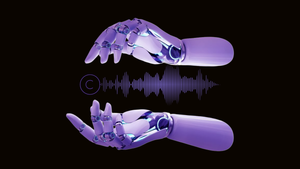Universal Music big cheese Lucian Grainge has sent a memo to the major’s employees providing a grand old update on the company’s negotiations with AI companies.
In it he bigs up future AI opportunities, reasserts the music industry’s position regarding the copyright obligations of AI companies and, perhaps most interestingly, indicates when the major plans to consult artists and songwriters before jumping into bed with AI businesses.
“To be clear”, he writes - before adding “this is very important” - Universal “will NOT license any model that uses an artist’s voice or generates new songs which incorporate an artist’s existing songs without their consent”. The implication, of course, is that artist and writer consent will not be sought for other uses of their music in the context of AI.
Universal, and the other majors, have already participated in pilot programmes with a number of AI companies of course, and are known to be in the midst of licensing talks with both AI start-ups and tech giants that are developing AI models and products.
The FT recently reported that Universal is close to signing off on some big deals, which may have prompted this memo.
Some of those deals will be mainly about licensing catalogue for AI companies to use in their training datasets, but some will relate to new AI-powered products which Universal and its artists may want to experiment with.
Grainge mainly bigs up the latter. “Based on what we’ve done with our AI partners to date and the new discussions that are underway”, he writes, “we can unequivocally say that AI has the potential to deliver creative tools that will enable us to connect our artists with their fans in new ways - and with advanced capability on a scale we’ve never encountered”.
To date a lot of the debate around music and AI has centred on the copyright obligations of AI companies, and whether they can get away with making use of music for free by exploiting copyright exceptions or the US concept of fair use.
In that debate artists and labels are more or less aligned, copyright exceptions and fair use do not apply and AI companies must secure - by which they mean buy - permission from the music industry to make use of existing music when developing AI products.
Lobbying and litigation continues as the music industry tries its best to ensure that is how the courts also ultimately interpret copyright rules.
But as soon as the majors start doing big catalogue-wide deals with AI companies, there will be divisions within the music community. Most artists and songwriters argue that, when it comes to AI, their explicit consent should be secured before their music is copied into any training datasets. But some labels and publishers, especially the majors, don’t necessarily see it that way.
That said, as Grainge’s memo confirms, there will be some scenarios where individual creator consent will almost certainly need to be sought, which includes those scenarios mentioned in the memo.
Where generative AI outputs content that imitates an artist’s voice or likeness, that likely exploits the artist’s publicity or personality rights, and neither AI companies nor labels can assume they are allowed to do that without explicit consent from the artist.
And while there remain ambiguities around how publicity rights will work in the context of AI - and in the UK publicity rights don’t yet exist in law - this is the area where politicians are most likely to strengthen the law to the creator’s advantage. Proposals to that effect are already being discussed in US Congress.
As for when AI “generates new songs which incorporate an artist’s existing songs”, that presumably means when the AI-generated work is a clear adaptation or rework of an existing song or songs. In most publishing contracts, the publisher would need to get songwriter approval before allowing an adaptation of that kind, whether it’s a human creator or an AI model doing the adapting.
So, while the music creator community will be pleased by Grainge’s commitments regarding artist voices and song adaptations in his big AI memo, that’s mainly the Universal boss confirming the scenarios in which his lawyers are certain creator consent is going to be required. Many artists and songwriters will be looking for much more from the majors as the big AI licensing deals start to get signed off.

